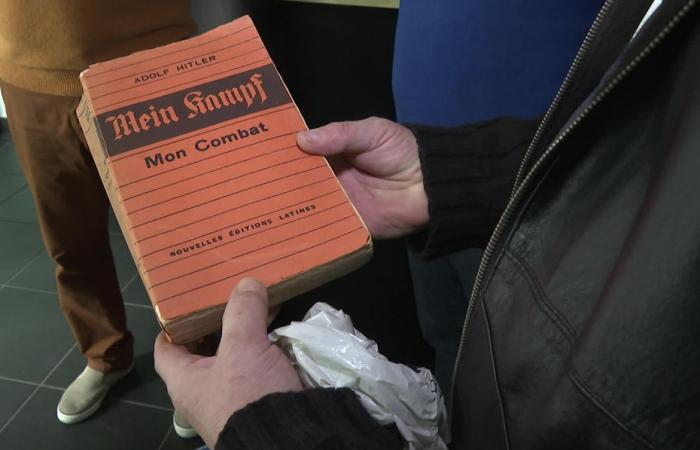By sorting out their gifts, the companions of Emmaüs Lescar-Pau discovered an original edition of Mein Kampf, the anti-Semitic manifesto of Adolf Hitler. Despite the high market value of the property, it was quickly decided to put it back to the Museum of Resistance and Deportation.
Most of the day: our exclusive selection
Every day, our editorial staff reserves you the best of the regional info. A selection just for you, to stay in connection with your regions.
France Télévisions uses your email address to send you the newsletter “The essentials of the day: our exclusive selection”. You can unsubscribe at any time via the link at the bottom of this newsletter. Our Privacy Policy
It is a discovery that they did not expect. The Emmaüs de Lescar village, near Pau, is used to receive donations of all kinds. Clothes, dishes, toys, or books by the thousands.
But at the beginning of 2025, Franck Cadinot, one of the companions responsible for sorting fell on a very particular work, who made him “Cold in the back”he explains. And for good reason, in his hands, an original edition, in a limited draw, of the French translation dating from 1934 of Mein Kampf, the anti -Semitic manifesto of Adolf Hitler.
This original edition, dated 1934, is a rare document. It can be consulted at the museum.
•
© France 3 Aquitaine
“I sort all the gifts that we are made, all the books pass in my hands and I decide what we put for sale, and those we put aside for recyclingexplains Franck Cadinot. But like all Emmaus Lescar-Pau staff, he is well aware that this copy of Mein Kampf cannot be treated so easily.
“There was a dilemma, recognizes Alexandre Regimbeau, sales manager of Emmaüs Lescar-Pau. This book can actually bring money for the village. But however, the balance immediately leaned in favor of a museum, for the duty of memory “.
This book has no place for sale. He has his place in consultation, to understand the dangers and the beginnings of who was Adolf Hitler.
-Alexandre RegimbeauEmmaus Lescar – Pau sales manager
Especially since the sale of this copy, particularly well preserved despite its 91 years, is prohibited: it does not include a warning to the reader. “Whether prohibited or not, all generations must know that this book has existed and that its content is horrible“Continues Alexandre Regimbeau.
The book, which has no warning to the reader, is prohibited for sale.
•
© France 3 Pau Sud Aquitaine
Emmaüs quickly proposed to donate it to the Museum of Resistance and Deportation. “”This is not a book that we are looking for, recognizes Jacques Boulze, volunteer at the museum. But his interest is that we can consult it on site. It has a value for historians mainly. If you don't look at its past, and this book is one of them, you can forget.
It allows us to understand what the rise of Nazism was based on: On the frustration of the masses and the ignorance of people.
Jacques BoulzeVolunteer at the Museum of Resistance and Deportation
The museum already owned other editions of Mein Kampf, including a version broke into German, formerly offered to all the newlyweds of the IIIᵉ Reich.






